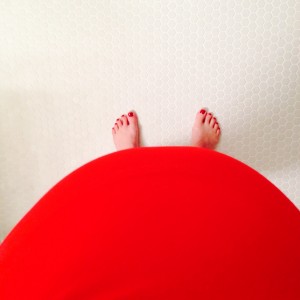Lost teeth like little pearls, pockets full of rocks and a forgotten butterscotch, smudged handprints on the windows, knee-high hugs—all of this smallness I will miss, certainly, when my wild little boys one day bend down to hug me, mornings their knees bang table legs as they pour gallons of milk into cereal bowls.
Navigating the dark house at night, we unearth mines of marbles and matchbox cars. Smallness defines these years—years of demands howled or sweetly pleaded. Years when all distractions can be justified, because they need me more than the empty page, though I’m sometimes surprised at how easily work and motherhood elbow writing into narrow spaces, by the weight of so many small things.
In Ellen Gilchrist’s essay, “The Middle Way,” she wishes “the young women of our fortunate world find ways to balance their lives. I hope they learn to rejoice and wait.”
Though I try to sustain Gilchrist’s view, I sometimes swing toward Tillie Olsen’s mourning “the thwarting of what struggles to come into being, but cannot,” and letting “writing die over and over again in me.”
I know I’m not alone in this, I’ve seen the standing-room-only crowds at AWP panels of parent-writers.
Hemingway pretty much summed it up when he said, “I like to do and can do many things better than I can write, but when I don’t write, I feel like shit.”
I cope with that feeling by piecing together, and making peace with, small windows of writing time.
Bill Roorbach writes, “You can get a lot done in the ten minutes a pile of Legos buys you with your three-year-old. You can still think while changing a diaper. You can still take a note or two for future reference before collapsing in a heap…But normal times, no baby at your breast, no death in the family: Call your writing work. Claim all the odd minutes that are built into even the busiest days for writing.”
At last summer’s Kachemak Bay Writer’s Conference, keynote speaker Naomi Shihab Nye reminded us that writing is a portable art. “Don’t wait for the weekend,” she said, “use all small increments.”
Keeping notebooks is one way of easing the feeling of letting words slip by.
In The Muses Among Us, Kim Stafford writes about the value of carrying a notebook to capture observations, dialogue, and stories. “I make the hearing and recording of them my mission as a writer,” says Stafford, “dreams get away if we don’t tell them, or write them down. Thoughts do the same. The writer’s greatest chance may be devotion to the passing fragment. It is small, but it is pure, and it may hold a compact infinity. You heard it for a reason.”
Entire books and essays can emerge from a small, deliberate practice. So can peace of mind.
When I was working on Gaining Daylight, the essay “Fifteen Times over the Bridge,” began as a quick daily walk that became a conscious act of observation and written reflection that helped the whole day feel less fragmented.
I just read The Forest Unseen, by biologist David Haskell. He spent a year watching a one-square-meter of old-growth forest in Tennessee, comparing the project to Tibetan monks creating a mandala—both are a way of seeking “the universal within the infinitesimally small.”
I see a similar pursuit in short-form genres like flash fiction and nonfiction. Anthologies of nonfiction pieces under 2,000 words like Short Takes or In Brief show us that oftentimes, brevity encourages creativity.
And there’s haiku, the definition of which sounds strikingly like life with small children: it “leaves no time to explain an experience” and instead “conveys an experience directly without commentary.”
I’ve seen the power of haiku described as the act of witnessing, of offering resistance to “the remorseless powers of forgetfulness.”
And isn’t that what troubles me when I’m not writing? The feeling that amid all this happy, exhausting chaos, I’m missing or forgetting what I should be capturing in words?
As I was looking for examples of beauty in small pieces, I opened Braided Creek: A Conversation in Poetry by Ted Kooser and Jim Harrison to this:
Treasure what you find
already in your pocket, friend.
On a hike last Sunday, Liam found an owl pellet in the dry grass on the peak. He carried the soft black handful carefully home. Later, head bowed at the kitchen table, he sorted vole bones small even for his nimble fingers, finding a tiny skull with teeth the size of splinters, while I marveled at the wonder of worlds in miniature, the owl and its meal, the boy and his curiosity, and what can be made of a day, what can and can’t be saved with words.

